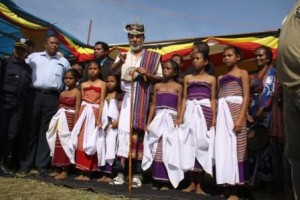State puts together a System to Combat Corruption

During a consultation on the Strategic National Development Plan (SNDP) in the Bazartete sub-district, on the 10th of August, the Prime Minister explained some of the measures that the Government is developing in matters regarding fighting corruption. Kay Rala Xanana Gusmão explained that “to fight corruption – an issue that is highly spoken of – the State is currently putting together a system, that passes through the establishment of the Public Service Commission, the Anti-Corruption Commission and, also, at this moment in time, the Government, through the Ministry of Justice, is developing a memorandum of understanding with the Portuguese Government to form the Criminal Investigation Police”.
The Head of Government gave the Indonesia Komisi Pemberentasan Korupsi (KPK) as an example, which “in the beginning faced many difficulties. Today the KPK is successful, capturing Ministers, businesspersons and other entities. With time, these institutions, established today by us, should be able to fight the practice of corruption. Corruption don’t only consist in offering money to another person, it is also corruption when someone allows a member of his party to have functions in government institutions”, stated the Prime Minister, answering to the issues presented by the Suco Chiefs.
The Bazartete Administrator, Augusto de Jesus, explained that his sub-district “is composed of 9 Sucos and 45 Villages. It has an area of 187 km2 limited by the following borders: to the east by the Dom Aleixo sub-district, Díli district and by the Laulara sub-district, Aileu district; to the west by the Liquiça sub-district, Liquiça district, to the south by the Railaku sub-district and the Ermera district; and the North borders with the maritime coast. The total of the population is around 25.060 persons, of which 12.583 are male and 12.477 are female. Bazartete has two seasons: the dry and the raining season.”
The concerns presented by the nine Suco chiefs pointed out the bad conditions of the roads, lack of: potable water, electric installation, health and education technicians, school materials (tables and chairs), the construction of a retirement home for the disable people and of a youth centre with sports, fishing and sewing equipment, update of data regarding elders and disable persons and to provide a larger support to the veterans.
Answering the concerns presented by the community leaders, the Prime Minister remembered that the PEDN is a plan for a decade (2011 to 2020) that consists in the creation of basic conditions for the development of all areas such as: infra-structures, education, training, health, agricultural productivity and food self-sufficiency and sustainable urbanization. It also includes the development of important sectors such as industry and employment.
The Head of Government added that during the second decade (2021 to 2030) the foundations to guarantee Timor-Leste’s competitiveness at a global level will be launched. Nowadays, the country is already mentioned in reports and global information about economy and also starts to enjoy a sustainable quality of life, projected to the future.










































